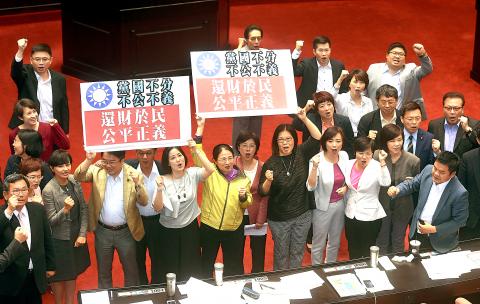An act to recover wrongfully paid government pensions was yesterday passed into law after a 10-year push, with former vice president Lien Chan (連戰) and prominent members of the Chinese Nationalist Party (KMT) to be asked to return some benefits.
The legislature approved the Act on the Settlement of the Combination of Years of Service in Public Sector and Political Organizations (公職人員年資併社團專職人員年資計發退離給與處理條例), which when promulgated requires people paid a pension for the time they spent working for the KMT and non-governmental organizations to return the excess payments within one year.
The act is expected to affect 381 former ministers, government officials and teachers, including Lien, former KMT vice chairman Jason Hu (胡志強) and former Examination Yuan president John Kuan (關中).

Photo: Fang Pin-chao, Taipei Times
Kuan has been overpaid about NT$10.11 million (US$335,301) and is obliged to pay it back, the Democratic Progressive Party (DPP) said.
Lien has been overpaid about NT$9.83 million; Hu has received NT$8.65 million; former Straits Exchange Foundation vice chairman Chiao Jen-ho (焦仁和) has received NT$3.73 million; former KMT vice chairman Lin Feng-cheng (林豐正) has received NT$1.09 million; former Judicial Yuan president Shih Chi-yang (施啟揚) has received NT$665,640; and former KMT chairman Wu Po-hsiung (吳伯雄) has received NT$171,360, the DPP said.
Their retirement benefits are to be adjusted by deducting the number of years they worked for the KMT or other political organizations from the number of years they worked in the public sector.
The Ministry of Civil Service is to announce the exact amount each person owes the state.
However, the act stipulates a pension floor of NT$25,000 per month to ensure basic living expenses for retirees. Those whose monthly pension is below the floor after adjustments will receive NT$25,000 per month.
The 381 retirees combined their political party and public sector service to qualify for government pensions because, in 1971, the Examination Yuan approved a regulation to allow KMT officials who held public office to combine years served as a civil servant with years worked as a party official.
A similar regulation was enacted for officials of the World League for Freedom and Democracy, the Asian Peoples’ Anti-Communist League, the National Development and Research Institute, the China Youth Corps, the Chinese Association for Relief and Ensuing Services and the Grand Alliance for China’s Reunification under the Three Principles of the People.
The regulations were abolished in 1987 and 2006 after government investigations determined that they violated the principle of equality.
However, KMT and party officials who had assumed government positions before the regulations were scrapped were still allowed to combine their years of service.
An investigation into the regulation was launched in 2005 during the administration of then-president Chen Shui-bian (陳水扁), and the DPP put forward a draft bill in 2007 to eliminate the practice, but the bill failed to pass the KMT-dominated legislature.

SECURITY: As China is ‘reshaping’ Hong Kong’s population, Taiwan must raise the eligibility threshold for applications from Hong Kongers, Chiu Chui-cheng said When Hong Kong and Macau citizens apply for residency in Taiwan, it would be under a new category that includes a “national security observation period,” Mainland Affairs Council (MAC) Minister Chiu Chui-cheng (邱垂正) said yesterday. President William Lai (賴清德) on March 13 announced 17 strategies to counter China’s aggression toward Taiwan, including incorporating national security considerations into the review process for residency applications from Hong Kong and Macau citizens. The situation in Hong Kong is constantly changing, Chiu said to media yesterday on the sidelines of the Taipei Technology Run hosted by the Taipei Neihu Technology Park Development Association. With

CARROT AND STICK: While unrelenting in its military threats, China attracted nearly 40,000 Taiwanese to over 400 business events last year Nearly 40,000 Taiwanese last year joined industry events in China, such as conferences and trade fairs, supported by the Chinese government, a study showed yesterday, as Beijing ramps up a charm offensive toward Taipei alongside military pressure. China has long taken a carrot-and-stick approach to Taiwan, threatening it with the prospect of military action while reaching out to those it believes are amenable to Beijing’s point of view. Taiwanese security officials are wary of what they see as Beijing’s influence campaigns to sway public opinion after Taipei and Beijing gradually resumed travel links halted by the COVID-19 pandemic, but the scale of

A US Marine Corps regiment equipped with Naval Strike Missiles (NSM) is set to participate in the upcoming Balikatan 25 exercise in the Luzon Strait, marking the system’s first-ever deployment in the Philippines. US and Philippine officials have separately confirmed that the Navy Marine Expeditionary Ship Interdiction System (NMESIS) — the mobile launch platform for the Naval Strike Missile — would take part in the joint exercise. The missiles are being deployed to “a strategic first island chain chokepoint” in the waters between Taiwan proper and the Philippines, US-based Naval News reported. “The Luzon Strait and Bashi Channel represent a critical access

Pope Francis is be laid to rest on Saturday after lying in state for three days in St Peter’s Basilica, where the faithful are expected to flock to pay their respects to history’s first Latin American pontiff. The cardinals met yesterday in the Vatican’s synod hall to chart the next steps before a conclave begins to choose Francis’ successor, as condolences poured in from around the world. According to current norms, the conclave must begin between May 5 and 10. The cardinals set the funeral for Saturday at 10am in St Peter’s Square, to be celebrated by the dean of the College